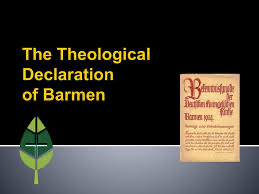 The Barmen Declaration
The Barmen Declaration
After 90 years the German church declaration rejecting Nazi policy remains an inspiration for Christian unity
Earlier this year the head of the World Council of Churches praised the Barmen Declaration, in which members of Germany's Confessing Church condemned Nazi incursions in church life, 90 years after it was signed.
In a recent message to the Evangelical Church in Germany (EKD), WCC general secretary Rev. Jerry Pillay stated that the declaration has helped Christians since 1934 to combat oppression and injustice.
"The Barmen Declaration has served as an inspiration to Christians facing tyranny, injustice, and discrimination of the need for the church to reject the claims of oppressive regimes and to combat heretical tendencies within its own ranks," said Pillay.
The Barmen Declaration, also known as the Theological Declaration of Barmen 1934, was a document created by Christians in Nazi Germany who opposed the fascists attempts to create a pro-Nazi German Evangelical church. It was adopted during a Synod in Wuppertal-Barmen in May 1934. The Declaration stated that the church was corrupted by making it subservient to the state and introducing Nazi ideology, which contradicted the teachings of Christianity.
The Declaration consisted of six theses:
1. The only source of revelation is Jesus Christ, and no other earthly powers should be accepted as sources.
2. Jesus Christ is the only authority in every aspect of personal life.
3. The message and order of the church should not be influenced by political convictions.
4. The church should not be ruled by a leader (Führer) and should have no hierarchy.
5. The state and the church should not fulfil each other's tasks and should focus on their own responsibilities.
6. The Declaration rejects the subordination of the church to the state and the subordination of the Word and Spirit to the church.
The Declaration emphasised that the church belongs solely to Christ and should seek guidance from Him. It rejected the domestication of the Word in the church and highlighted the Lordship of Jesus Christ and the unity of the church through the Word of God and faith.
The Declaration also called for discernment of teachings and encouraged adherence to Scripture and the Confessions of the Fathers. It aimed to establish a consensus among the Lutheran, Reformed, and United churches against the pro-Nazi "German Christianity."
The document was primarily written by Karl Barth, a Reformed theologian, but underwent modifications with input from Lutheran theologians. It became the chief confessional document of the Confessing Church and has been included in the confessional books of various denominations, such as the Presbyterian Church (USA) and the Moravian Unity. It was an appeal to Protestants to reject the policies of the so-called "German Christians" who supported National Socialism and its policies in church life.
Article by Dr Ian Watson, County Ecumenical Officer for Norfolk and Waveney. WCC general secretary quote from Ecumenical News, May 2024.
Picture: courtesy of Slideplayer.com